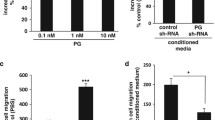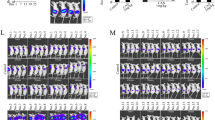Abstract
Background
The prokineticin1 (PROK1) gene has been cloned as an angiogenic growth factor from endocrine gland cells. However, we have not known about potentials of anti-PROK1 monoclonal antibody in human cancers. Here we investigated how the anti-PROK1 monoclonal antibody (mAb; established by our department) would affect the high-PROK1-expressing colorectal cancer (CRC) cells in vitro and vivo.
Methods
We confirmed PROK1 protein expression in the CRC cells by performing immunohistochemical staining and measured the amount of soluble PROK1 protein. Next, we mixed the CRC cell culture fluid with the anti-PROK1mAb to examine angiogenic activity in vitro and in vivo. Additionally, we investigated whether the anti-PROK1mAb would affect the tumor-forming capability of high PROK1-expressing CRC cells implanted into mice.
Results
PROK1 protein expression was confirmed in 3 CRC cell lines, and soluble PROK1 protein was also confirmed in the CRC cell culture fluid. The culture fluid increased angiogenesis in vitro and vivo, whereas the anti-PROK1mAb suppressed angiogenesis. Subcutaneous tumor formation and tumor angiogenesis in mice were suppressed by the anti-PROK1mAb treatment. The anti-PROK1mAb significantly suppressed the number of CD31 stained cells in mice.
Conclusions
The in vitro and vivo experimental system indicated that the anti-PROK1mAb could suppress angiogenesis and tumor growth in the CRC strains.





Similar content being viewed by others
References
Ferlay J, Shin HR, Bray F, Forman D, Mathers C, Parkin DM. Estimates of worldwide burden of cancer in 2008: GLOBOCAN 2008. Int. J Cancer. 2010;127:2893–917.
Watanabe T, Itabashi M, Shimada Y, Tanaka S, Ito Y, Ajioka Y, et al. Japanese society for cancer of the colon and rectum: Japanese society for cancer of the colon and rectum (JSCCR) guidelines 2010 for the treatment of colorectal cancer. Int J Clin Oncol. 2012;17:1–29.
Hanahan D, Folkman J. Patterns and emerging mechanisms of the angiogenic switch during tumorigenesis. Cell. 1996;86:353–64.
Ferrara N. Pathways mediating VEGF-independent tumor angiogenesis. Cytokine Growth Factor Rev. 2010;21:21–6.
Saltz LB, Clarke S, Díaz-Rubio E, Scheithauer W, Figer A, Wong R, et al. Bevacizumab in combination with oxaliplatin-based chemotherapy as first-line therapy in metastatic colorectal cancer: a randomized phase III study. J Clin Oncol. 2008;26:2013–9.
Van Cutsem E, Köhne CH, Hitre E, Zaluski J, Chang Chien CR, Makhson A, et al. Cetuximab and chemotherapy as initial treatment for metastatic colorectal cancer. N Engl J Med. 2009;360:1408–17.
Amado RG, Wolf M, Peeters M, Van Cutsem E, Siena S, Freeman DJ, et al. Wild-type KRAS is required for panitumumab efficacy in patients with metastatic colorectal cancer. J Clin Oncol. 2008;26:1626–34.
Grothey A, Van Cutsem E, Sobrero A, Siena S, Falcone A, Ychou M, et al. Regorafenib monotherapy for previously treated metastatic colorectal cancer (CORRECT): an international, multicenter, randomized, placebo-controlled, phase 3 trial. Lancet. 2013;381:303–12.
Tabernero J, Van Cutsem E, Lakomy R, Prausová J, Ruff P, van Hazel GA, et al. Aflibercept versus placebo in combination with fluorouracil, leucovorin and irinotecan in the treatment of previously treated metastatic colorectal cancer: prespecified subgroup analyses from the VELOUR trial. Eur J Cancer. 2014;50:320–31.
LeCouter J, Kowalski J, Foster J, Hass P, Zhang Z, Dillard-Telm L, et al. Identification of an angiogenic mitogen selective for endocrine gland endothelium. Nature. 2001;412:877–84.
Nagano H, Goi T, Koneri K, Hirono Y, Katayama K, Yamaguchi A. Endocrine gland-derived vascular endothelial growth factor (EG-VEGF) expression in colorectal cancer. J Surg Oncol. 2007;96:605–10.
Goi T, Fujioka M, Satoh Y, Tabata S, Koneri K, Nagano H, et al. Angiogenesis and tumor proliferation/metastasis of human colorectal cancer cell line SW620 transfected with endocrine gland-derived-vascular endothelial growth factor, as a new angiogenic factor. Cancer Res. 2004;64:1906–10.
Ngan ES, Sit FY, Lee K, Miao X, Yuan Z, Wang W, et al. Implications of endocrine gland-derived vascular endothelial growth factor/prokineticin-1 signaling in human neuroblastoma progression. Clin Cancer Res. 2007;13:868–75.
Pasquali D, Rossi V, Staibano S, De Rosa G, Chieffi P, Prezioso D, et al. The endocrine-gland-derived vascular endothelial growth factor (EG-VEGF)/prokineticin 1 and 2 and receptor expression in human prostate: up-regulation of EG-VEGF/prokineticin 1 with malignancy. Endocrinology. 2006;147:4245–51.
Morales A, Vilchis F, Chávez B, Chan C, Robles-Díaz G, Díaz-Sánchez V. Expression and localization of endocrine gland-derived vascular endothelial growth factor (EG-VEGF) in human pancreas and pancreatic adenocarcinoma. J Steroid Biochem Mol Biol. 2007;107:37–41.
Goi T, Yamaguchi A, Nakagawara G, Urano T, Shiku H, Furukawa K. Reduced expression of deleted colorectal carcinoma (DCC) protein in established colon cancers. Br J Cancer. 1998;77:466–71.
Kowanetz M, Ferrara N. Vascular endothelial growth factor signaling pathways: therapeutic perspective. Clin Cancer Res. 2006;12:5018–22.
Avraamides CJ, Garmy-Susini B, Varner JA. Integrins in angiogenesis and lymphangiogenesis. Nat Rev Cancer. 2008;8:604–17.
Clarke MF, Dick JE, Dirks PB, Eaves CJ, Jamieson CH, Jones DL, et al. Cancer stem cells—perspectives on current status and future directions: AACR Workshop on cancer stem cells. Cancer Res. 2006;66:9339–44.
Robert GJ, Huch M, Clevers H. Stem cells and cancer of the stomach and intestine. Nat Rev Cancer. 2010;6:373–84.
Moumen M, Chiche A, Decraene C, Petit V, Gandarillas A, Deugnier MA, et al. Myc is required for β-catenin-mediated mammary stem cell amplification and tumorigenesis. Mol Cancer. 2013;12:132.
Olino K, Wada S, Edil BH, Pan X, Meckel K, Weber W, et al. Tumor-associated antigen expressing Listeria monocytogenes induces effective primary and memory T-cell responses against hepatic colorectal cancer metastases. Ann Surg Oncol. 2012;19:S597–607.
Kalluri R, Zeisberg M. Fibroblasts in cancer. Mol Oncol. 2006;4:392–401.
Kaplan RN, Riba RD, Zacharoulis S, Bramley AH, Vincent L, Costa C, et al. VEGFR1-positive haematopoietic bone marrow progenitors initiate the pre-metastatic niche. Nature. 2005;438:820–7.
Miller AR, McBride WH, Hunt K, Economou JS. Cytokine-mediated gene therapy for cancer. Ann Surg Oncol. 1994;1:436–50.
Goi T, Nakazawa T, Hirono Y, Yamaguchi A. Prokineticin 1 expression in gastrointestinal tumors. Anticancer Res. 2013;33:5311–5.
Tabata S, Goi T, Nakazawa T, Kimura Y, Katayama K, Yamaguchi A. Endocrine gland-derived vascular endothelial growth factor strengthens cell invasion ability via prokineticin receptor 2 in colon cancer cell lines. Oncol. Rep. 2013;29:459–63.
Acknowledgment
The technical assistance of Ms. Saitoh M. with this research was appreciated. This work was supported in part by a Grant-in-Aid for Science Research from the Ministry of Education, Sports, Science, and Technology of Japan (No. 25462047).
Disclosure
The authors declare that they have no competing interests.
Author information
Authors and Affiliations
Corresponding author
Rights and permissions
About this article
Cite this article
Goi, T., Nakazawa, T., Hirono, Y. et al. Anti-Prokineticin1 (PROK1) Monoclonal Antibody Suppresses Angiogenesis and Tumor Growth in Colorectal Cancer. Ann Surg Oncol 21 (Suppl 4), 665–671 (2014). https://doi.org/10.1245/s10434-014-3765-8
Received:
Published:
Issue Date:
DOI: https://doi.org/10.1245/s10434-014-3765-8




